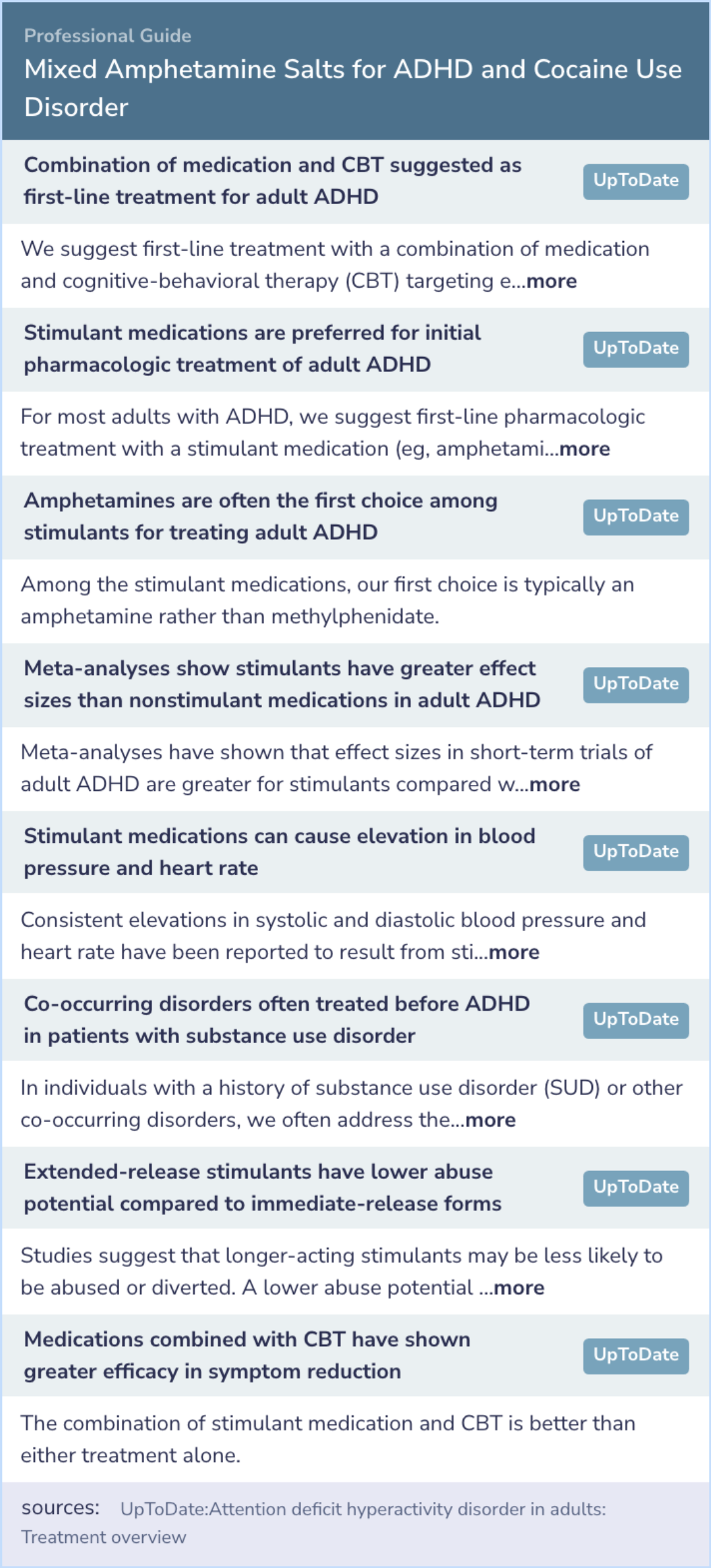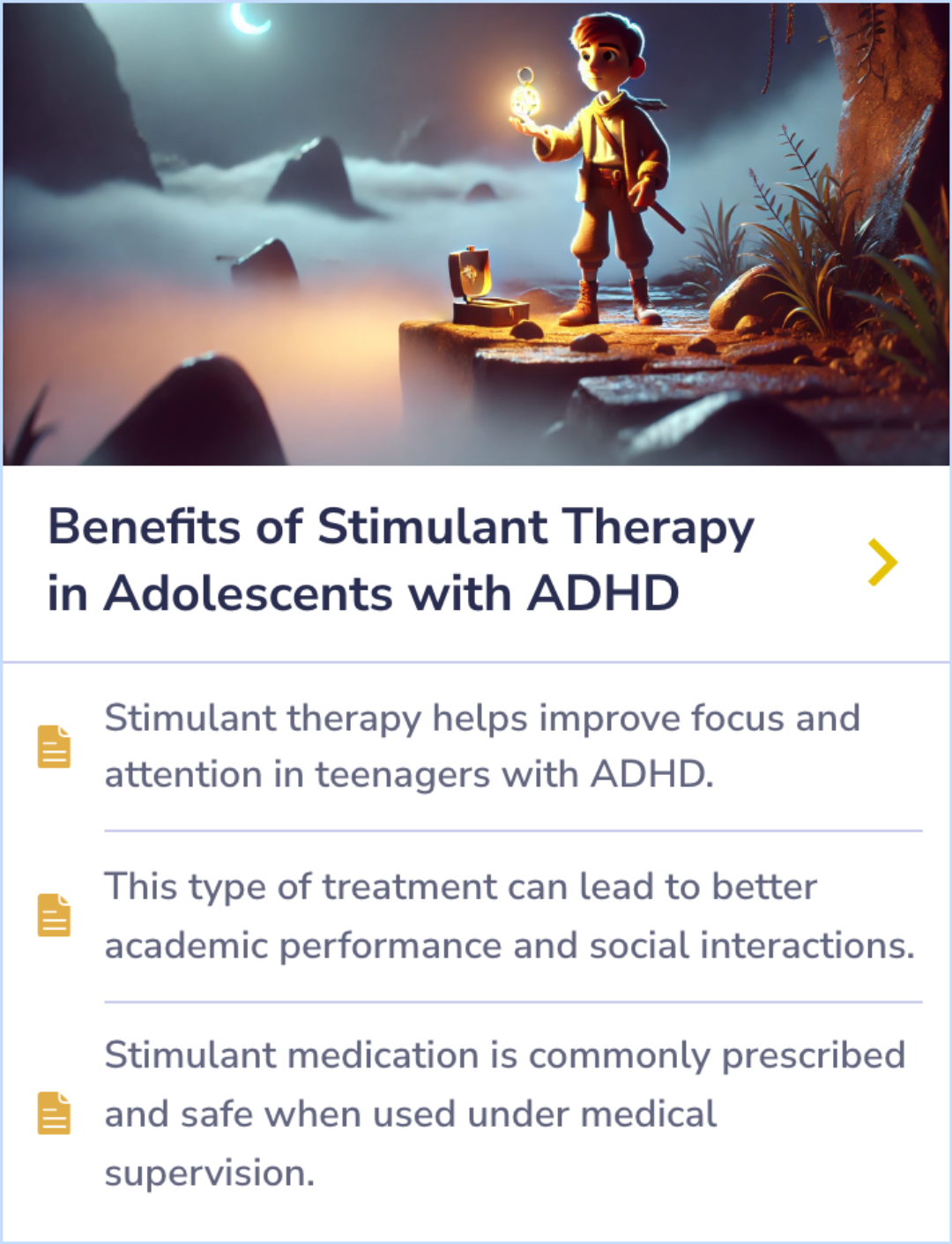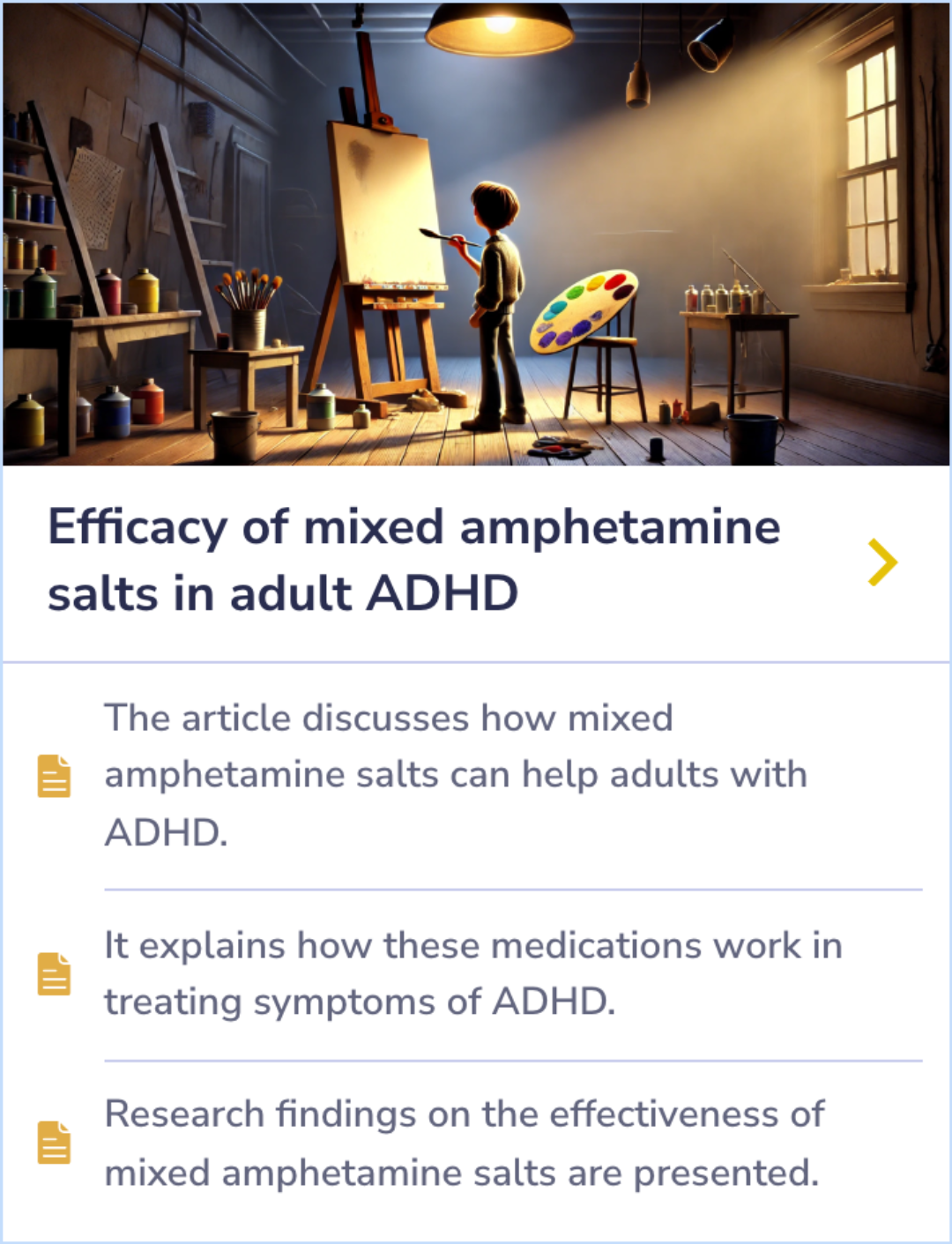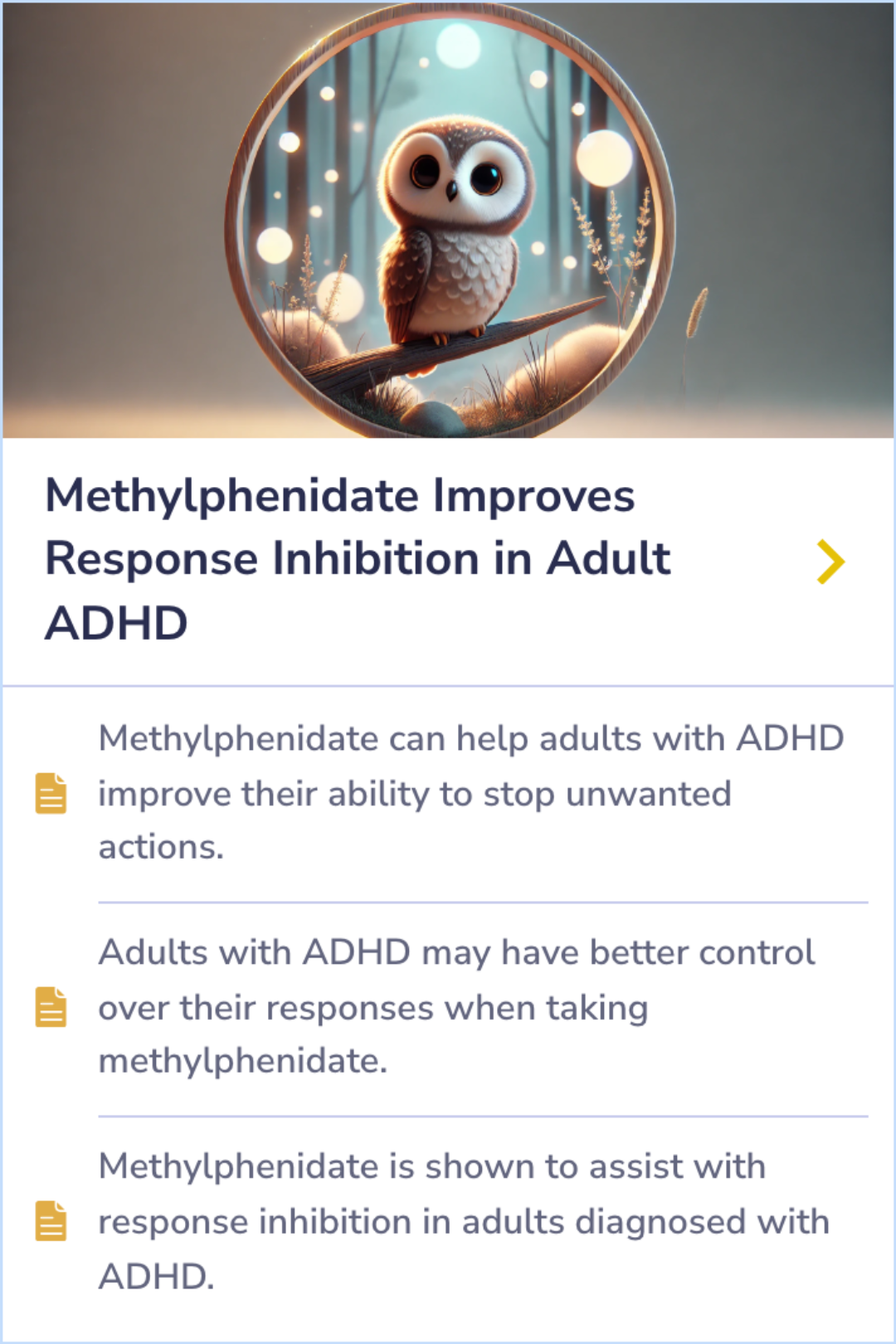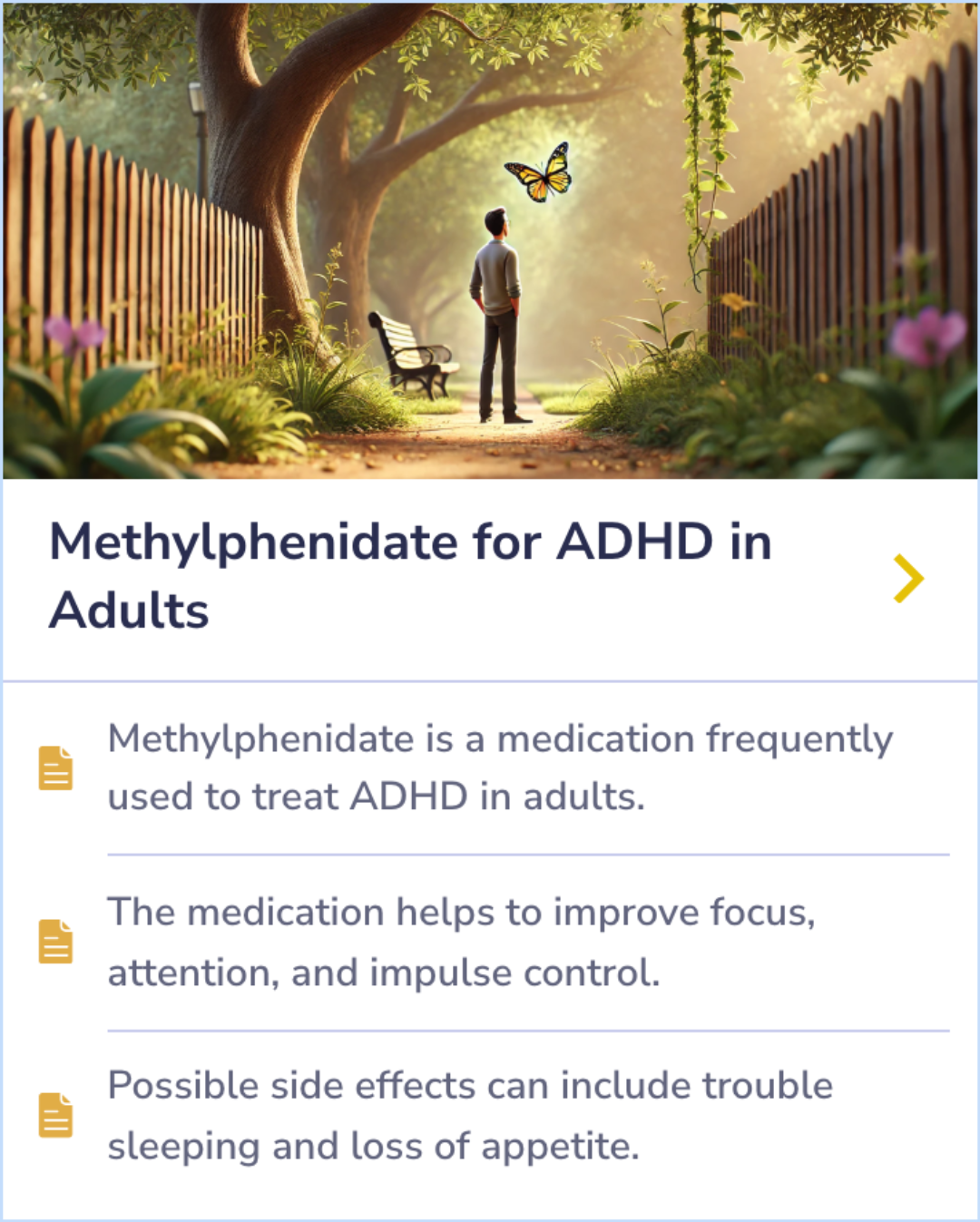Adderall Study Database
Visual Abstract
Extended-Release Mixed Amphetamine Salts vs Placebo for Comorbid Adult Attention-Deficit/Hyperactivity Disorder and Cocaine Use Disorder: A Randomized Clinical Trial
Extended-Release Adderall (Mixed Amphetamine Salts) Improves ADHD Symptoms and Reduces Cocaine Use
October 18, 2024
author
Levin FR, Mariani JJ, Specker S, Mooney M, Mahony A, Brooks DJ, Babb D, Bai Y, Eberly LE, Nunes EV, Grabowski J
journal
JAMA Psychiatry
Date Published
2015 Jun
Why link to a visual abstract?
What is a visual abstract?
Original
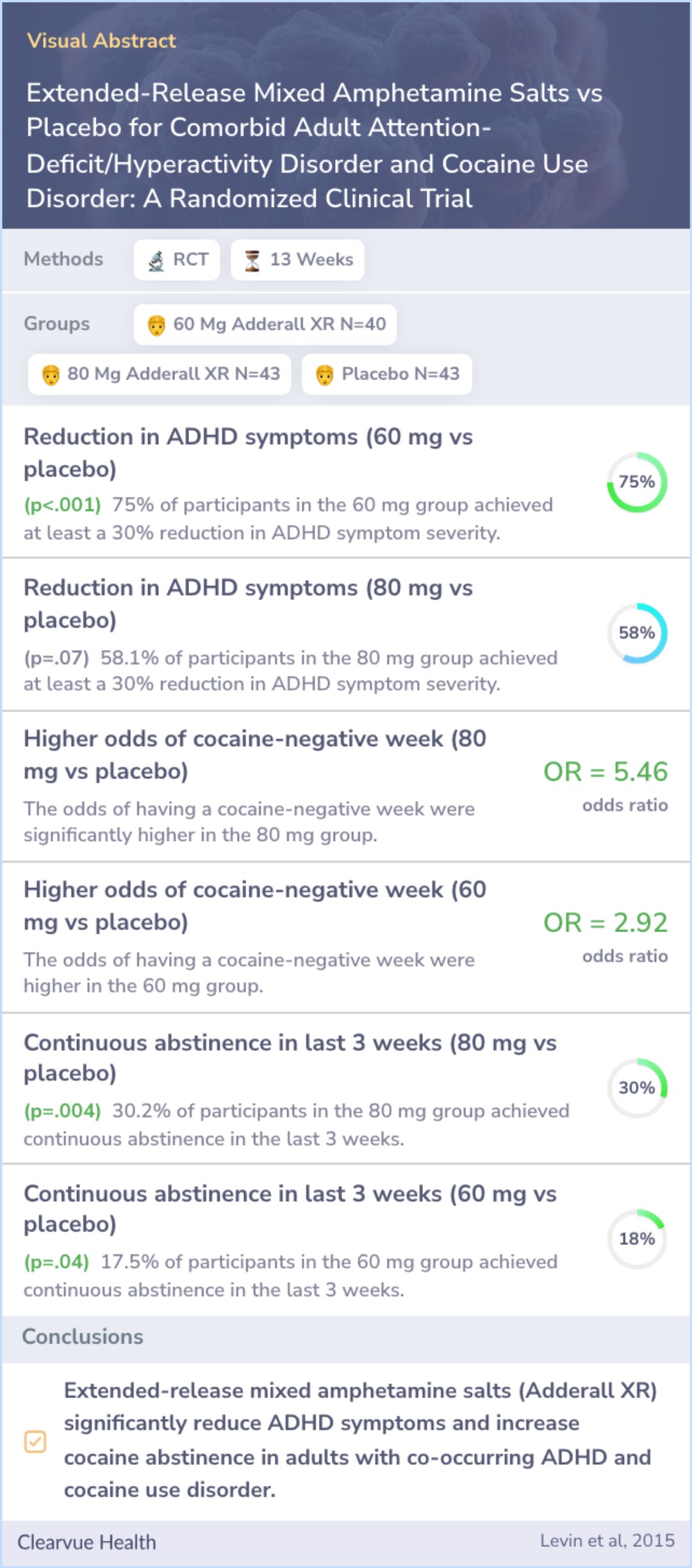
Study Summary
🔬
What They Studied
The researchers studied whether extended-release mixed amphetamine salts (Adderall XR) can improve ADHD symptoms and reduce cocaine use in adults with both ADHD and cocaine use disorder.
💡
What They Found
They found that extended-release mixed amphetamine salts (Adderall XR) significantly reduced ADHD symptoms and increased the likelihood of cocaine abstinence compared to a placebo.
📚
What This Means
These findings suggest that treating ADHD with extended-release mixed amphetamine salts (Adderall XR) can also help reduce cocaine use in adults who have both conditions, supporting the idea of screening and treating ADHD in this population.
Study Summary
Study Overview
This study explored whether treating adults who have both ADHD and cocaine use disorder (CUD) with extended-release mixed amphetamine salts could help reduce their ADHD symptoms and decrease cocaine use. The researchers believed that higher doses of this medication might be more effective for both conditions. The study combined medication with cognitive behavioral therapy (CBT) to see if this approach could offer better results for these individuals.
The findings suggested that treating ADHD in adults with CUD using higher doses of extended-release mixed amphetamine salts could indeed help reduce cocaine use. However, the researchers caution that while the results are promising, they should be viewed cautiously until further studies confirm these findings. The study also highlighted that safety concerns must be managed carefully, especially when using higher doses of the medication in this population.
The findings suggested that treating ADHD in adults with CUD using higher doses of extended-release mixed amphetamine salts could indeed help reduce cocaine use. However, the researchers caution that while the results are promising, they should be viewed cautiously until further studies confirm these findings. The study also highlighted that safety concerns must be managed carefully, especially when using higher doses of the medication in this population.
Abstract: background
To examine whether treatment of co-occurring ADHD and cocaine use disorder with extended-release mixed amphetamine salts is effective at both improving ADHD symptoms and reducing cocaine use.

Efficacy of combined treatment
"Extended-release mixed amphetamine salts in robust doses along with cognitive behavioral therapy are effective for treatment of co-occurring ADHD and cocaine use disorder, both improving ADHD symptoms and reducing cocaine use."
Need for cautious interpretation
"While our findings are promising and suggest that robust dosing of a long-acting amphetamine formulation reduces both ADHD symptoms and cocaine use, this needs to be viewed cautiously in the context of the extant literature and requires replication."
Potential risks and necessary considerations
"In addition to the risk of abuse or diversion, stimulant medications may worsen certain psychiatric conditions, such as bipolar disorder or schizophrenia. Clearly, any potential benefits need to be weighed against possible risks."
Study Summary
Methods
The study was conducted as a 13-week, randomized, double-blind trial, meaning neither the participants nor the researchers knew who was receiving the treatment or placebo. The trial included 126 adults who met the criteria for both ADHD and cocaine use disorder, according to the DSM-IV-TR guidelines. Participants were divided into three groups: two groups received different doses (60 mg or 80 mg) of extended-release mixed amphetamine salts (Adderall XR), while the third group received a placebo. All participants also underwent weekly cognitive behavioral therapy (CBT), a form of counseling aimed at changing patterns of thinking and behavior. The effectiveness of the treatment was measured by a reduction in ADHD symptoms and the number of weeks participants reported being free of cocaine use, confirmed by weekly urine tests.
Abstract: methods
Thirteen-week, randomized, double-blind, 3-arm, placebo-controlled trial of participants meeting DSM-IV-TR criteria for both ADHD and cocaine use disorder conducted between December 1, 2007, and April 15, 2013, at 2 academic health center substance a...more

Study Summary
Results
The results indicated that patients receiving the medication showed a more significant improvement in ADHD symptoms compared to those on placebo. Specifically, 75% of participants on the 60 mg dose and 58.1% on the 80 mg dose saw at least a 30% reduction in ADHD symptoms. In contrast, only 39.5% of those on placebo experienced similar improvements. Furthermore, the odds of having cocaine-free weeks were higher in those receiving the medication. The 80 mg dose was particularly effective, with 30.2% of participants achieving continuous abstinence from cocaine in the last three weeks of the trial, compared to only 7% in the placebo group. This suggests that extended-release mixed amphetamine salts can significantly help reduce cocaine use while also managing ADHD symptoms.
Abstract: results
More patients achieved at least a 30% reduction in ADHD symptom severity in the medication groups (60 mg: 30 of 40 participants [75.0%]; odds ratio [OR] = 5.23; 95% CI, 1.98–13.85; P < .001; and 80 mg: 25 of 43 participants [58.1%]; OR = 2.27; 95% CI...more
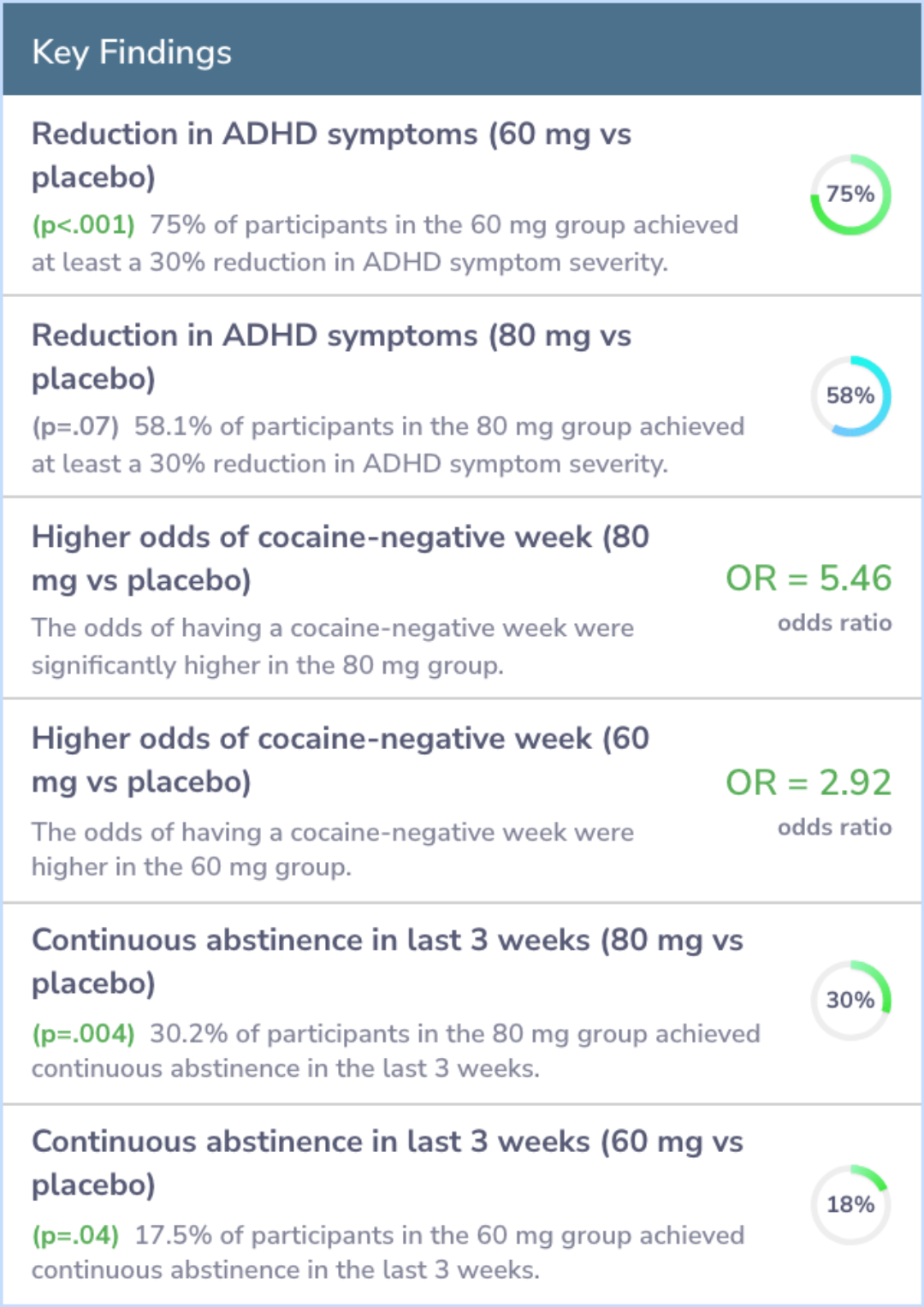
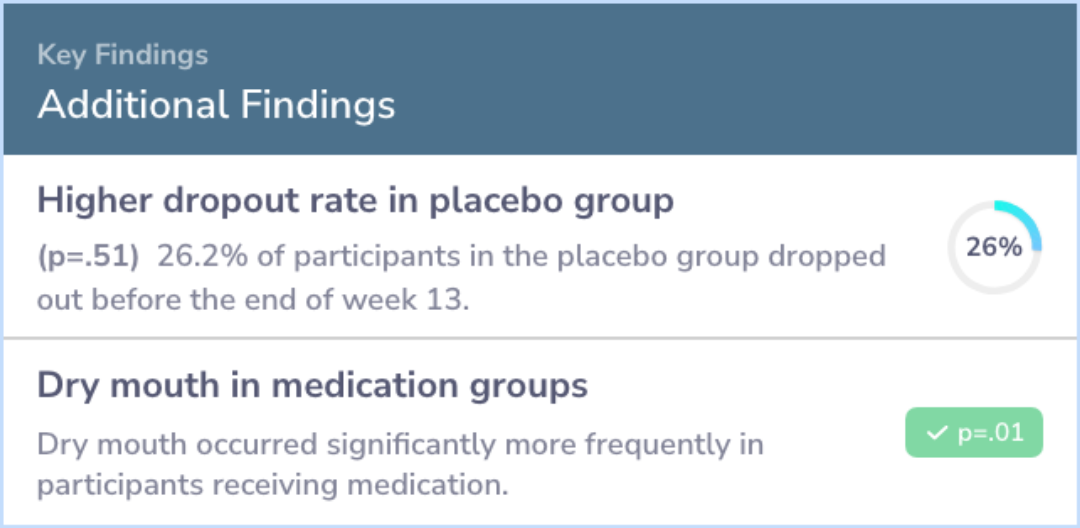
Study Summary
Conclusions
The study concludes that extended-release mixed amphetamine salts, when used in combination with cognitive behavioral therapy, are effective in treating adults with both ADHD and cocaine use disorder. This dual treatment approach not only improves ADHD symptoms but also reduces cocaine use, highlighting the potential benefits of using ADHD medications like Adderall XR in treating substance use disorders. The findings emphasize the need for screening and treating ADHD in adults who present with cocaine use disorder, as addressing both conditions simultaneously can lead to better overall outcomes.
Abstract: conclusions
Extended-release mixed amphetamine salts in robust doses along with cognitive behavioral therapy are effective for treatment of co-occurring ADHD and cocaine use disorder, both improving ADHD symptoms and reducing cocaine use. The data suggest the im...more
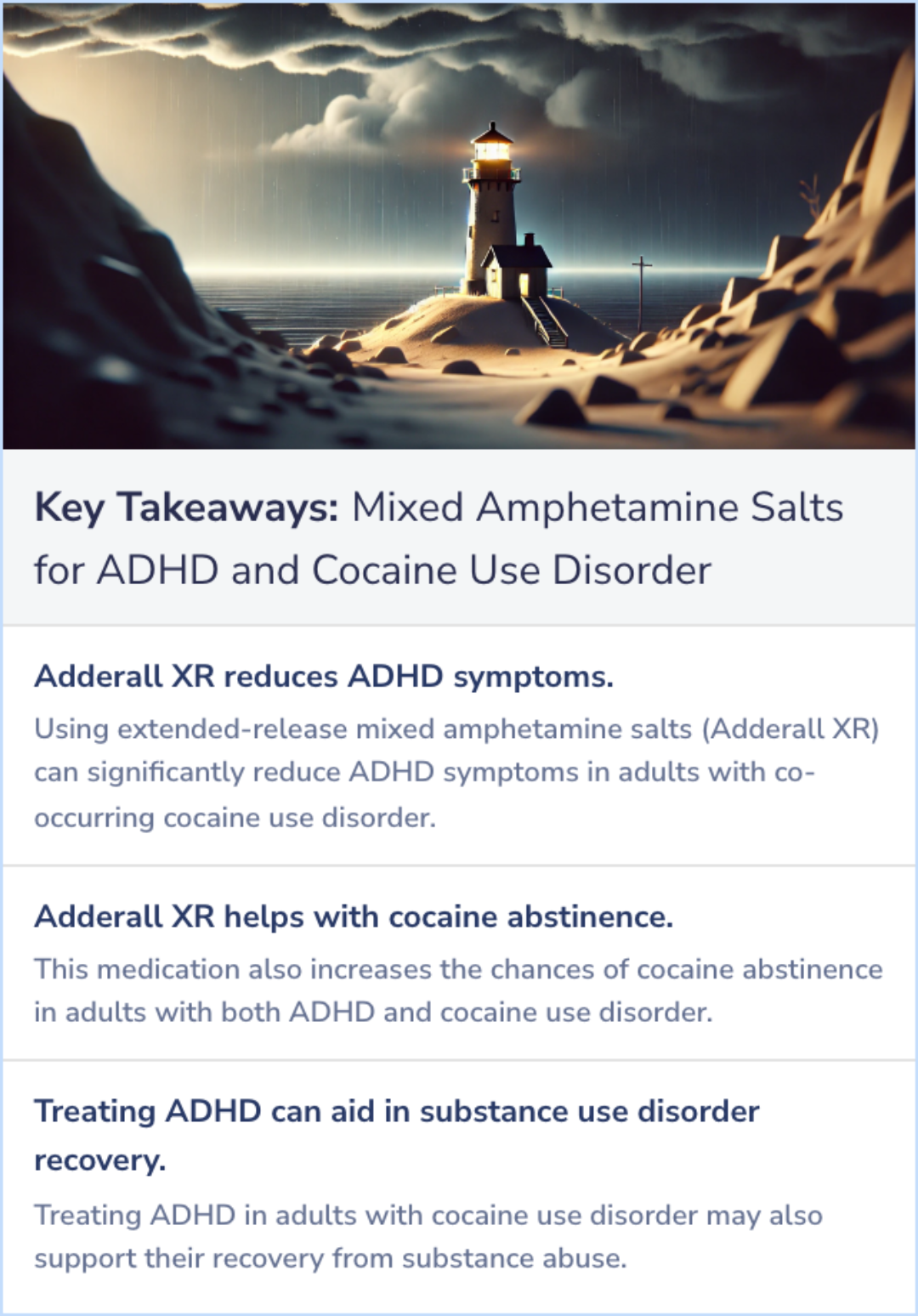
Background Information
Patient Guide
💊
Adderall: Approved for ADHD
Adderall is FDA-approved for ADHD, increasing attention and reducing impulsivity in both children and adults.
🧠
Adderall's Role in Cognitive Behavioral Therapy
Adderall is often used as part of a comprehensive ADHD treatment plan, which includes psychological and social interventions.
🧬
Mechanism: Dopamine and Norepinephrine Reuptake
Adderall blocks the reuptake of dopamine and norepinephrine, increasing their levels in the brain to improve focus.
❤️
Cardiovascular Monitoring
Patients on Adderall require regular cardiac monitoring due to potential increases in heart rate and blood pressure.
🔄
Methylphenidate vs Amphetamine: Similar Mechanism
Both medications work by increasing norepinephrine and dopamine levels, offering comparable mechanisms for treating ADHD.
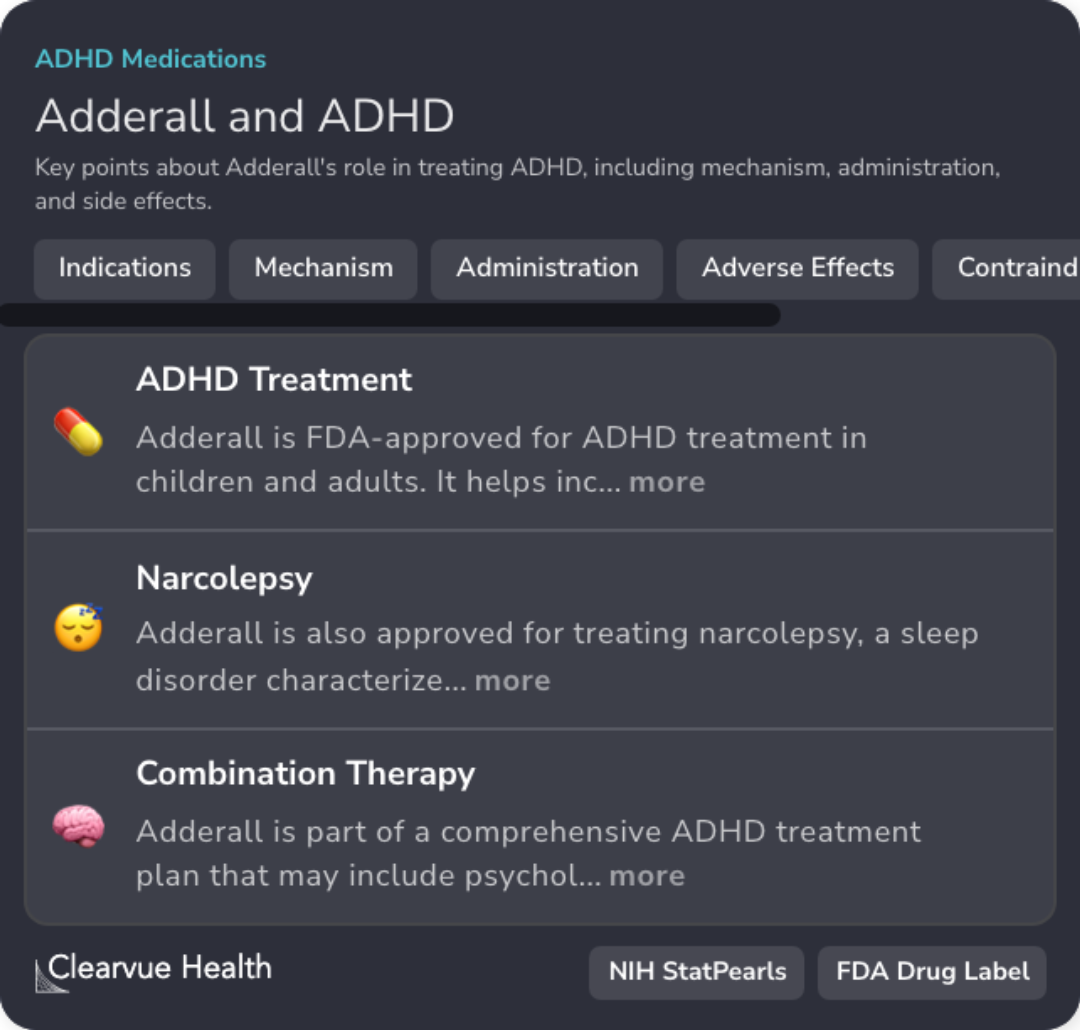
Professional Guide
Expert Opinion: Mixed Amphetamine Salts for ADHD and Cocaine Use Disorder
The findings from the abstract underscore the effectiveness of combining medication with cognitive-behavioral therapy (CBT) in treating adults with ADHD, particularly those with co-occurring substance use disorders. This aligns with current guidelines that recommend a combination of stimulant medications and CBT as the first-line treatment for most adults diagnosed with ADHD.
Amphetamines, often preferred over methylphenidate, show greater efficacy in symptom reduction, consistent with the results observed in the study.
Additionally, the preference for extended-release stimulants due to their lower abuse potential is particularly relevant for patients with a history of substance use disorders.
However, clinicians must be aware of the potential cardiovascular side effects of stimulant medications, as consistent elevations in blood pressure and heart rate have been reported.
Amphetamines, often preferred over methylphenidate, show greater efficacy in symptom reduction, consistent with the results observed in the study.
Additionally, the preference for extended-release stimulants due to their lower abuse potential is particularly relevant for patients with a history of substance use disorders.
However, clinicians must be aware of the potential cardiovascular side effects of stimulant medications, as consistent elevations in blood pressure and heart rate have been reported.
Evidence Summary
Boosting Focus: Stimulant Therapy for ADHD in Adolescents
Stimulant therapy enhances focus and attention for teenagers with ADHD, supporting them in achieving better academic results and social skills. This proven treatment, when supervised by physicians, remains a safe option, aligning with practices for managing ADHD symptoms. The detailed approach in the therapy highlights its role in addressing adolescent challenges.
While the broader study investigates mixed amphetamine salts in adults, this offers a glimpse into the beneficial impact on younger individuals, emphasizing improvement even in complex cases.
While the broader study investigates mixed amphetamine salts in adults, this offers a glimpse into the beneficial impact on younger individuals, emphasizing improvement even in complex cases.
Evidence Summary
Unveiling ADHD Symptom Relief with Mixed Amphetamine Salts
Exploring how mixed amphetamine salts address adult ADHD, research reveals these medications significantly reduce symptoms. By demonstrating effectiveness, the findings illuminate their impact on adult patients seeking relief.
This examination shares how these medications work against ADHD symptoms, pointing to how adults can benefit. Highlighting results emphasizes the value of mixed amphetamine salts in treating adult ADHD.
This examination shares how these medications work against ADHD symptoms, pointing to how adults can benefit. Highlighting results emphasizes the value of mixed amphetamine salts in treating adult ADHD.
Evidence Summary
Methylphenidate: Aiding Impulse Control in Adults with ADHD
Methylphenidate enhances the ability of adults with ADHD to manage impulsive behavior, aiding in better response control. The medication has shown potential in helping individuals halt undesired actions, thereby improving overall reaction management. Those diagnosed with ADHD may find greater success in controlling their reactions and inhibiting impulsive responses with methylphenidate, offering a way to improve daily functioning.
Evidence Summary
Balancing Methylphenidate's Benefits and Side Effects in Adult ADHD
Methylphenidate is often prescribed for adult ADHD, known for boosting focus and controlling impulsivity. However, users may experience side effects like insomnia and a decreased appetite. This medication plays a key role in managing symptoms, despite its potential downsides.
While mixed amphetamine salts were highlighted in recent studies for those with ADHD and cocaine use disorder, it's noteworthy how methylphenidate alone addresses ADHD symptoms effectively.
While mixed amphetamine salts were highlighted in recent studies for those with ADHD and cocaine use disorder, it's noteworthy how methylphenidate alone addresses ADHD symptoms effectively.
